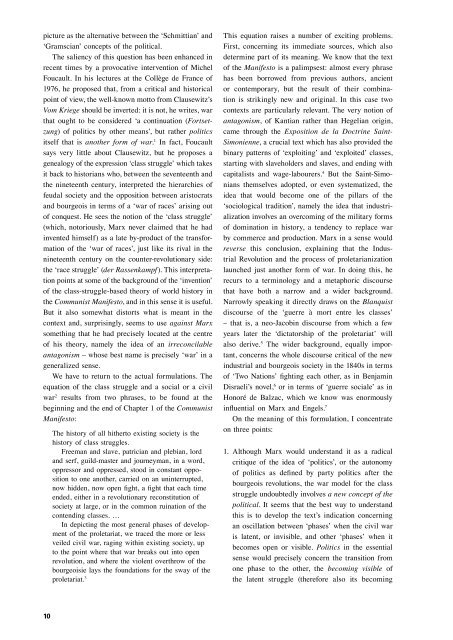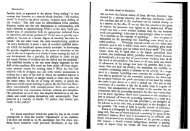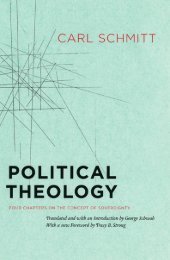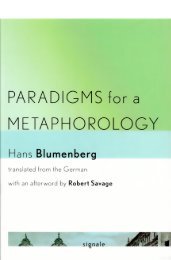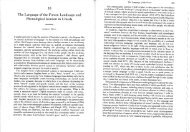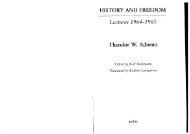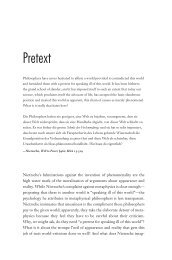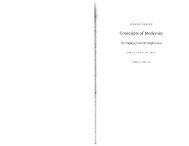Balibar Marxism and War.pdf - Townsend Humanities Lab
Balibar Marxism and War.pdf - Townsend Humanities Lab
Balibar Marxism and War.pdf - Townsend Humanities Lab
Create successful ePaper yourself
Turn your PDF publications into a flip-book with our unique Google optimized e-Paper software.
picture as the alternative between the ‘Schmittian’ <strong>and</strong><br />
‘Gramscian’ concepts of the political.<br />
The saliency of this question has been enhanced in<br />
recent times by a provocative intervention of Michel<br />
Foucault. In his lectures at the Collège de France of<br />
1976, he proposed that, from a critical <strong>and</strong> historical<br />
point of view, the well-known motto from Clausewitz’s<br />
Vom Kriege should be inverted: it is not, he writes, war<br />
that ought to be considered ‘a continuation (Fortsetzung)<br />
of politics by other means’, but rather politics<br />
itself that is another form of war. 1 In fact, Foucault<br />
says very little about Clausewitz, but he proposes a<br />
genealogy of the expression ‘class struggle’ which takes<br />
it back to historians who, between the seventeenth <strong>and</strong><br />
the nineteenth century, interpreted the hierarchies of<br />
feudal society <strong>and</strong> the opposition between aristocrats<br />
<strong>and</strong> bourgeois in terms of a ‘war of races’ arising out<br />
of conquest. He sees the notion of the ‘class struggle’<br />
(which, notoriously, Marx never claimed that he had<br />
invented himself) as a late by-product of the transformation<br />
of the ‘war of races’, just like its rival in the<br />
nineteenth century on the counter-revolutionary side:<br />
the ‘race struggle’ (der Rassenkampf). This interpretation<br />
points at some of the background of the ‘invention’<br />
of the class-struggle-based theory of world history in<br />
the Communist Manifesto, <strong>and</strong> in this sense it is useful.<br />
But it also somewhat distorts what is meant in the<br />
context <strong>and</strong>, surprisingly, seems to use against Marx<br />
something that he had precisely located at the centre<br />
of his theory, namely the idea of an irreconcilable<br />
antagonism – whose best name is precisely ‘war’ in a<br />
generalized sense.<br />
We have to return to the actual formulations. The<br />
equation of the class struggle <strong>and</strong> a social or a civil<br />
war 2 results from two phrases, to be found at the<br />
beginning <strong>and</strong> the end of Chapter 1 of the Communist<br />
Manifesto:<br />
The history of all hitherto existing society is the<br />
history of class struggles.<br />
Freeman <strong>and</strong> slave, patrician <strong>and</strong> plebian, lord<br />
<strong>and</strong> serf, guild-master <strong>and</strong> journeyman, in a word,<br />
oppressor <strong>and</strong> oppressed, stood in constant opposition<br />
to one another, carried on an uninterrupted,<br />
now hidden, now open fight, a fight that each time<br />
ended, either in a revolutionary reconstitution of<br />
society at large, or in the common ruination of the<br />
contending classes. …<br />
In depicting the most general phases of development<br />
of the proletariat, we traced the more or less<br />
veiled civil war, raging within existing society, up<br />
to the point where that war breaks out into open<br />
revolution, <strong>and</strong> where the violent overthrow of the<br />
bourgeoisie lays the foundations for the sway of the<br />
proletariat. 3<br />
This equation raises a number of exciting problems.<br />
First, concerning its immediate sources, which also<br />
determine part of its meaning. We know that the text<br />
of the Manifesto is a palimpsest: almost every phrase<br />
has been borrowed from previous authors, ancient<br />
or contemporary, but the result of their combination<br />
is strikingly new <strong>and</strong> original. In this case two<br />
contexts are particularly relevant. The very notion of<br />
antagonism, of Kantian rather than Hegelian origin,<br />
came through the Exposition de la Doctrine Saint-<br />
Simonienne, a crucial text which has also provided the<br />
binary patterns of ‘exploiting’ <strong>and</strong> ‘exploited’ classes,<br />
starting with slaveholders <strong>and</strong> slaves, <strong>and</strong> ending with<br />
capitalists <strong>and</strong> wage-labourers. 4 But the Saint-Simonians<br />
themselves adopted, or even systematized, the<br />
idea that would become one of the pillars of the<br />
‘sociological tradition’, namely the idea that industrialization<br />
involves an overcoming of the military forms<br />
of domination in history, a tendency to replace war<br />
by commerce <strong>and</strong> production. Marx in a sense would<br />
reverse this conclusion, explaining that the Industrial<br />
Revolution <strong>and</strong> the process of proletarianization<br />
launched just another form of war. In doing this, he<br />
recurs to a terminology <strong>and</strong> a metaphoric discourse<br />
that have both a narrow <strong>and</strong> a wider background.<br />
Narrowly speaking it directly draws on the Blanquist<br />
discourse of the ‘guerre à mort entre les classes’<br />
– that is, a neo-Jacobin discourse from which a few<br />
years later the ‘dictatorship of the proletariat’ will<br />
also derive. 5 The wider background, equally important,<br />
concerns the whole discourse critical of the new<br />
industrial <strong>and</strong> bourgeois society in the 1840s in terms<br />
of ‘Two Nations’ fighting each other, as in Benjamin<br />
Disraeli’s novel, 6 or in terms of ‘guerre sociale’ as in<br />
Honoré de Balzac, which we know was enormously<br />
influential on Marx <strong>and</strong> Engels. 7<br />
On the meaning of this formulation, I concentrate<br />
on three points:<br />
1. Although Marx would underst<strong>and</strong> it as a radical<br />
critique of the idea of ‘politics’, or the autonomy<br />
of politics as defined by party politics after the<br />
bourgeois revolutions, the war model for the class<br />
struggle undoubtedly involves a new concept of the<br />
political. It seems that the best way to underst<strong>and</strong><br />
this is to develop the text’s indication concerning<br />
an oscillation between ‘phases’ when the civil war<br />
is latent, or invisible, <strong>and</strong> other ‘phases’ when it<br />
becomes open or visible. Politics in the essential<br />
sense would precisely concern the transition from<br />
one phase to the other, the becoming visible of<br />
the latent struggle (therefore also its becoming<br />
10


